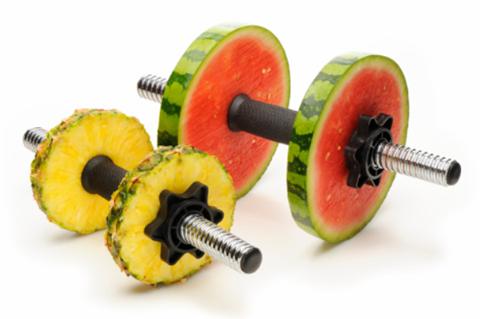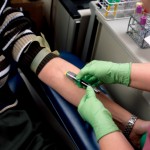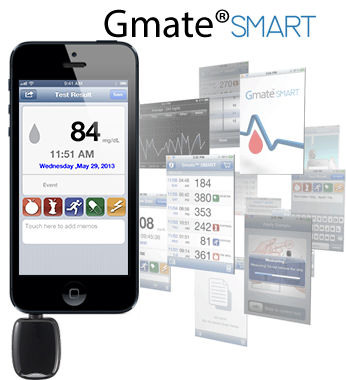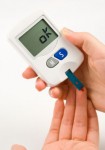The CDiabetes News Brief: August 24 to 30, 2014
Compiled and edited by Elizabeth Klein, MPhil
Changes to meal and exercise plans show big improvements in health
 Healthcare providers know that a good meal plan and regular exercise are important if you want to stay healthy, especially if you have diabetes. This can help you keep blood glucose levels low, and has other health benefits, too. A recent study has shown that this is even more important than we thought. About 600 patients were split into 3 groups and then tested over 6 months to see how they improved. The two groups that were given meal and exercise plans along with normal treatment lowered their risk for diabetes complications. They had much better results than people who made no specific lifestyle changes.
Healthcare providers know that a good meal plan and regular exercise are important if you want to stay healthy, especially if you have diabetes. This can help you keep blood glucose levels low, and has other health benefits, too. A recent study has shown that this is even more important than we thought. About 600 patients were split into 3 groups and then tested over 6 months to see how they improved. The two groups that were given meal and exercise plans along with normal treatment lowered their risk for diabetes complications. They had much better results than people who made no specific lifestyle changes.
The internet can be a bad source of health information if you’re not careful
 The internet is a great place to get useful information, but you have to be careful because sometimes what you find is wrong or out-of-date. To find out how people looked for weight loss advice online, a new study tested 103 popular sites for how good or useful their information was. The researchers found that most sites did not give good advice. University and government websites were the best overall, but news sites were among the worst, at about the same level as commercial websites. This shows how important it is to make sure that any source of health information you use is reliable.
The internet is a great place to get useful information, but you have to be careful because sometimes what you find is wrong or out-of-date. To find out how people looked for weight loss advice online, a new study tested 103 popular sites for how good or useful their information was. The researchers found that most sites did not give good advice. University and government websites were the best overall, but news sites were among the worst, at about the same level as commercial websites. This shows how important it is to make sure that any source of health information you use is reliable.
Most Americans say they struggle to eat and exercise well
 We all know how hard it is to eat well sometimes. It’s normal to give in to cravings for unhealthy food, and this is okay as long as you stay healthy most of the time. A new study from Nielsen showed that many Americans have problems with actually doing the things they think are healthy. As many as 75% said that eating well is important, but 50% also said that they think meal plans hard to stick to. 66% admit to eating unhealthy things more than they should and not getting enough physical activity.
We all know how hard it is to eat well sometimes. It’s normal to give in to cravings for unhealthy food, and this is okay as long as you stay healthy most of the time. A new study from Nielsen showed that many Americans have problems with actually doing the things they think are healthy. As many as 75% said that eating well is important, but 50% also said that they think meal plans hard to stick to. 66% admit to eating unhealthy things more than they should and not getting enough physical activity.
Adding beans and pulses might help you to eat less throughout the day
 If you often don’t feel full after meals and like to snack throughout the day, there could be a solution. New research has shown that people who add beans or pulses to their normal food felt fuller after meals, without having to eat more calories. This means food like kidney beans, lentils, black beans, and chickpeas make it easier for you to eat less through the day, which is good if you’re on a strict meal plan. Other studies showed that eating beans can also help you lose more weight than just calorie counting.
If you often don’t feel full after meals and like to snack throughout the day, there could be a solution. New research has shown that people who add beans or pulses to their normal food felt fuller after meals, without having to eat more calories. This means food like kidney beans, lentils, black beans, and chickpeas make it easier for you to eat less through the day, which is good if you’re on a strict meal plan. Other studies showed that eating beans can also help you lose more weight than just calorie counting.
Blood tests during hospital visits could help you avoid getting diabetes
 If you don’t have diabetes and go to hospital for a different condition, blood tests might show that you have higher blood glucose levels than is healthy. This can be a useful way for healthcare providers to know if you have a high chance of getting diabetes later. A new study found that people who had high blood glucose levels during these tests were much more likely to get diabetes sometime in the next 3 years than those who didn’t, especially if they were men over 40 years old.
If you don’t have diabetes and go to hospital for a different condition, blood tests might show that you have higher blood glucose levels than is healthy. This can be a useful way for healthcare providers to know if you have a high chance of getting diabetes later. A new study found that people who had high blood glucose levels during these tests were much more likely to get diabetes sometime in the next 3 years than those who didn’t, especially if they were men over 40 years old.
New system from Philosys could give better blood glucose results
 New treatments and gadgets are being created all the time to help you control your diabetes better. Some of them, like the Gmate Smart System, could make it easier for you to stay healthy. Invented by South Korean company Philosys, the Gmate was recently approved by the FDA for sale in America. It works by measuring your blood glucose levels and sending the results to your smartphone or tablet, where you can see them in a chart or send them to your healthcare provider. Philosys says this can give better readings overall, and help you understand patterns in your blood glucose levels.
New treatments and gadgets are being created all the time to help you control your diabetes better. Some of them, like the Gmate Smart System, could make it easier for you to stay healthy. Invented by South Korean company Philosys, the Gmate was recently approved by the FDA for sale in America. It works by measuring your blood glucose levels and sending the results to your smartphone or tablet, where you can see them in a chart or send them to your healthcare provider. Philosys says this can give better readings overall, and help you understand patterns in your blood glucose levels.
Choosing not to drive to work can make you healthier
 It can sometimes be hard to resist the temptation to drive to work, but it’s usually healthier if you make an effort to walk or cycle when you can. Research shows that even taking public transport, like a train or bus, instead of driving makes a difference. A study of over 7,000 people from the UK found that people who did not drive to work and who walked, cycled, or took public transport instead had a lower chance of being overweight than those who mostly drove. This was true for both men and women, from all backgrounds and age groups.
It can sometimes be hard to resist the temptation to drive to work, but it’s usually healthier if you make an effort to walk or cycle when you can. Research shows that even taking public transport, like a train or bus, instead of driving makes a difference. A study of over 7,000 people from the UK found that people who did not drive to work and who walked, cycled, or took public transport instead had a lower chance of being overweight than those who mostly drove. This was true for both men and women, from all backgrounds and age groups.
People with different levels of education stay active in different ways
 Healthcare providers are always looking for new ways to help people in different areas of society get healthier. Knowing how different kinds of people live is an important part of that. Recent studies have shown that if you have a college education, you’re likely to exercise over weekends. If you don’t have a high school diploma, you’re more likely to stay active during the week, as part of your job. However, this kind of work activity is often not intense enough and can be repetitive, which causes problems in the long run.
Healthcare providers are always looking for new ways to help people in different areas of society get healthier. Knowing how different kinds of people live is an important part of that. Recent studies have shown that if you have a college education, you’re likely to exercise over weekends. If you don’t have a high school diploma, you’re more likely to stay active during the week, as part of your job. However, this kind of work activity is often not intense enough and can be repetitive, which causes problems in the long run.
People with diabetes have higher chance of getting pancreatic cancer
 Having diabetes increases the chances that you’ll eventually get other conditions as well, which make staying healthy with this disease very important. One way that you can do this is by getting regular checks for things like pancreatic cancer. New research has shown that when people are first diagnosed with diabetes, their chances of getting pancreatic cancer is much higher than normal. This does not go down for at least 20 years afterwards. However, controlling blood glucose levels with insulin or other medicines also lowered that risk in the long run, which shows the importance of proper care.
Having diabetes increases the chances that you’ll eventually get other conditions as well, which make staying healthy with this disease very important. One way that you can do this is by getting regular checks for things like pancreatic cancer. New research has shown that when people are first diagnosed with diabetes, their chances of getting pancreatic cancer is much higher than normal. This does not go down for at least 20 years afterwards. However, controlling blood glucose levels with insulin or other medicines also lowered that risk in the long run, which shows the importance of proper care.
New laser blood test might replace finger pricks in the future
 The most common way for people with diabetes to check their blood glucose level is to prick their finger to draw blood then test it with an electronic monitor. This is often painful, especially for people who do it regularly. Because of this, new ways of testing blood are tested all the time, and a new one might be the answer. With a special kind of laser, the device tests blood glucose just by reading chemicals on your skin. It’s still being developed and is not as accurate as blood tests right now, but it could be very useful technology in the future.
The most common way for people with diabetes to check their blood glucose level is to prick their finger to draw blood then test it with an electronic monitor. This is often painful, especially for people who do it regularly. Because of this, new ways of testing blood are tested all the time, and a new one might be the answer. With a special kind of laser, the device tests blood glucose just by reading chemicals on your skin. It’s still being developed and is not as accurate as blood tests right now, but it could be very useful technology in the future.

